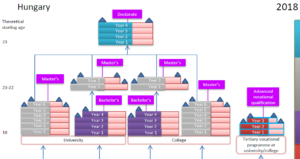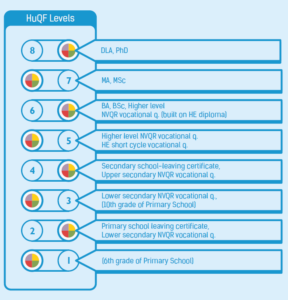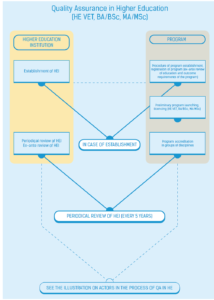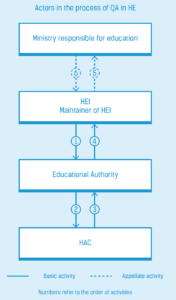
Hungary
Last updated in 2020
Chapter 1: Higher Education System
Section 1.1.: Schematic Description of the Higher Education System
http://gpseducation.oecd.org/CountryProfile?primaryCountry=HUN
Section 1.2: Description of Higher Education System
The Bologna-type three-cycle degree system has been introduced in September 1, 2006. First-cycle degree programmes (6 to 8 semesters, 180 to 240 credits) lead to a Bachelors’ degree, while second-cycle degree programmes (2 to 4 semesters, 60 to 120 credits) lead to a Masters’ degree. In certain fields of study (e.g. in medicine, dentistry, pharmacy, law, teacher training etc.), Masters’ degree can be obtained following the completion of single cycle long Masters’ degree programmes (10 to 12 semesters, 300 to 360 credits). Based on a Masters’ degree, PhD or DLA (Doctor of Liberal Arts) degrees as third cycle degrees can be awarded after 8 semesters of study (240 credits).
Higher education institutions may also offer tertiary vocational programmes (short cycle programmes; 30 to 120 credits that can be recognised in relevant Bachelor programmes), not leading to a higher education degree. Postgraduate specialisation programmes also do not lead to a higher degree (but to a new qualification).
Higher education programmes are either offered as full time or part time (evening or correspondence) courses or as distance education.
Section 1.3: Number of Higher Education Institutions
Number of HEIs by type:
|
Public universities
|
21
|
|
Non-public universities
|
8
|
|
Public universities of applied sciences
|
5
|
|
Non-public universities of applied sciences
|
4
|
|
Public colleges
|
1
|
|
Non-public colleges
|
26
|
|
Total
|
65
|
Section 1.4 Number of Students in Higher Education
Academic year 2019/2020 (as of October 2019)
|
Number of students by degree cycle and by maintainer
|
||||
|
|
Public
|
Non-public
|
Total
|
|
|
Tertiary vocational programmes
|
9 890
|
1 307
|
11 197
|
|
|
First cycle programmes (BA/BSc)
|
141 209
|
30 895
|
172 104
|
|
|
Second cycle programmes (MA/MSc)
|
26 984
|
6 097
|
33 081
|
|
| Single cycle long MA/MSc programmes | 37 515 | 6 004 | 43 519 | |
| Postgraduate specialisation programmes | 11 013 | 4 782 | 15 795 | |
|
Doctoral programmes (PhD/DLA)
|
8 532
|
882
|
9 414
|
|
|
Total
|
235 143
|
49 967
|
285 110
|
|
|
Number of foreign students by degree cycle
|
|
|
Tertiary vocational programmes
|
127
|
|
First cycle programmes (BA/BSc)
|
18 254
|
|
Second cycle programmes (MA/MSc)
|
5 898
|
|
Single cycle long MA/MSc programmes
|
10 771
|
|
Postgraduate specialisation programmes
|
974
|
|
Doctoral programmes (PhD/DLA)
|
2 398
|
|
Total
|
38 422
|
Section 1.5: Structure of Academic Year
The Act CCIV of 2011 on the National Higher Education (NHEA) only stipulates that the academic year lasts 10 months and one term lasts 5 months. The organisation of the academic year (determined by the Senate) does not vary from one type of programme to the next within the same institution.
|
The organisation of the academic year in higher education in Hungary
|
|
|
Type of information
|
Dates or periods
|
|
Number and length of intervals
|
2 intervals, 5 months each
|
|
Beginning of the academic year
|
Usually between 1 and 10 of September
|
|
Autumn term
|
From the beginning of September until the end of January. The exact dates are fixed by the institutions.
|
|
Teaching activity
|
From early or mid-September to mid-December.
|
|
Exam period
|
From mid-December to the end of January.
|
|
Holidays
|
In addition to national/public/church holidays, holiday periods vary greatly.
|
|
Spring term
|
From the beginning of February to the end of June
The exact dates are fixed by the institutions.
|
|
Teaching activity
|
From the beginning of February to mid-May.
|
|
Exam period
|
From mid-May to the end of June.
|
|
(Holiday)
|
In spring term there is usually a one-week holiday around Easter (mid-April).
|
Section 1.6: National Qualifications Framework (or Similar)
A government resolution on developing the Hungarian Qualifications Framework (HuQF) and joining the European Qualifications Framework was adopted in 2008. Following that there was a period of research in order to describe the levels of a qualifications framework most suitable for the Hungarian system of qualifications. An inter-ministerial working group established in January 2011 started to draft the government resolution on the legal and institutional background of the future HuQF.
The development of the Hungarian Qualifications Framework (HuQF) was performed between 2010-2015. As part of the development process, the state accredited vocational qualifications and qualifications, the state-aknowledged higher education qualifications were referenced and included in the HuQF. Some non-formal qualification groups have also been included in the HuQF such as qualifications obtained through post-graduate short courses in higher education and labour-market oriented vocational qualifications gained through adult learning courses.
The referencing procedure, in which the levels of the HuQF were adjusted to the levels of the European Qualifications Framework (EQF) was completed in February 2015 and was adopted by the EQF Advisory Group. Self-certificating of the levels of higher education qualifications to the Qualifications Framework of European Higher Education Area (QF-EHEA) has been included in he referencing report as well. Between 2016 and 2018, the relevant legislation on vocational training and higher education was amended, thus already fixing the levels of qualifications in HuQF and EQF and requiring their inclusion in vocational certificates and higher education diplomas. Hungary has also included its qualifications into a database, which has been linked to the European qualifications database. Hungary is also participating in the development of e-Europass to ensure the international transparency and readability of its qualifications.
HuQF is an 8-level framework containing 4 descriptor categories. The framework is open to the inclusion of the qualifications of the non-formal training sector as well. It serves as an overarching communication tool.
HuQF is featured as a competence-framework. Competence is generally defined in pedagogy and learning research as consisting of integrated dimensions of “knowledge”, “skills”, “attitudes” and its functioning is featured by “autonomy and responsibility”. HuQF applies these descriptor categories at each level.
Referencing and self-certification report of the Hungarian qualifications framework to the EQF and to the QF EHEA: https://www.oktatas.hu/pub_bin/dload/LLL/HuQF/HuQF_referencing_report.pdf
Section 1.7: Learning Outcomes in Higher Education
The register of higher education qualifications contains by study field the bachelor, master and tertiary vocational programmes that may lead to the award of tertiary qualifications. The qualifications awarded for the completion of these programmes are linked to levels of the Hungarian Qualifications Framework (hereinafter referred to as ‘HuQF’), referenced to the relevant levels of the European Qualifications Framework (hereinafter referred to as ‘EQF’).
Learning outcomes for qualifications that give access to jobs, occupations and activities, and knowledge requirements for tertiary vocational qualifications, bachelor and master degrees and qualifications are laid down, in a manner that enables the relevant knowledge, skills and attitudes, and autonomy and responsibility to be referenced to HuQF level descriptors, in the Decree No 18/2016 of the Minister of Human Capacities of 5 August 2016 on the programme and outcome requirements of tertiary vocational, bachelor and master programmes.
Higher education institutions were extensively and intensively involved in the development of the programme and outcome requirements and were required (by law) to transform curricula of their study programmes meeting the above requirements before the beginning of the academic year of 2017/2018.
Section 1.8: Admission Requirements to Higher Education
Admission to a tertiary vocational programme, a bachelor programme or a single-cycle long programme is conditional upon the successful completion of the secondary school leaving examination.
The government – after consulting higher education institutions – annually publishes the capacity of each institution (that is, the maximum number of students to be admitted) broken down by fields and also the minimum scores required for admission into higher education (as a quality criterion). The scores are calculated based on the central/national upper secondary school-leaving exam which is required to obtain a secondary school leaving certificate.
According to the government decree on admission requirements, only students with scores 240 (out of 500) or above may be admitted to higher education, and students with scores 280 or above to Bachelors or single-cycle Master’s programmes. From the academic year of 2020/2021, admission requirements include successfully passing an advanced level secondary school leaving exam in at least one subject. In certain fields, admission may be conditional upon the possession of a specific level of language proficiency and/or upon an assessment of medical or occupational fitness or a career aptitude assessment.
The minister responsible for higher education defines each year the minimum score for admission for the state funded spaces of each faculty. Consequently, the minimum admission score might exceed 400 in the case of some faculties. A central computerised algorithm ranks the applicants of each programme and, on the basis of the programme’s admission capacity, it provides a list of successful applicants.
Applicants may submit their application to more than one HEI and/or programme: on their application form, they indicate their preference of the institutions/programmes by ranking them and are admitted to the first one for which their score is sufficient.
Entry and admission requirements in Hungary follow the standards of the Bologna Process. To have access to Master’s programmes, the applicant must have a Bachelor’s degree, and to have access to a PhD programme, the applicant must have a Master’s degree.
See also: https://www.felvi.hu/for_foreigners/higher_education/the_admission/
Section 1.9: Grading System
The general requirements of grading in higher education is regulated by Government Decree no. 87 of 2016 on implementation of certain provisions of the NHEA. According to the government decree, grading scale applied by HEIs for the assessment of students’ knowledge may by a three-grade scale [fail (1), satisfactory (3), excellent (5)] or a five-grade scale [fail (1), pass (2), satisfactory (3), good (4), excellent (5)], or any other assessment system laid that is comparable and is laid down in the Studies and Examinations Regulation of the HEI.
Another indicator of academic achievement is credit index (also regulated by the above government decree) that serves for quantitative and qualitative assessment of the student’s academic workload. Credit index = ∑( credits x grade )/30, where credit index applies to one semester.
Hungarian grading v.s. ECTS grades:
|
University grade
|
Equivalent ECTS grade
|
|
5 (excellent)
|
A, B (excellent, very good)
|
|
4 (good)
|
C (good)
|
|
3 (satisfactory)
|
D (satisfactory)
|
|
2 (pass)
|
E (sufficient)
|
|
1 (fail)
|
F, FX (fail)
|
Section 1.10: Tuition Fee System for International Students
Tuition fees vary depending on institution (public, private), programme and level of study. (Bachelor programmes are usually less expensive.) It may also differ based on the citizenship of the prospective students (EU citizen or non-EU citizen), and on the language of the programme. (Foreign language programmes are usually more expensive.)
Depending on the HEI the tuition fee is between 700-4000 EUR/semester.
Further information and actual prices can be found on the website of HEIs or in the central register: The above examples are based on the official register of all study programmes offered by HEIs in Hungary.
Section 1.11: Graduation Requirements and/or Qualification Awarding Requirements
Graduation and qualification awarding requirements are defined by the Act CCIV of 2011 on National Higher Education.
For the completion of a tertiary vocational programme (leading to the award of a tertiary level qualification attested by a diploma, not qualifying as a degree), a minimum of one hundred and twenty credits shall be acquired. The programme and outcome requirements of a tertiary vocational programme shall specify the field of study it belongs to.
The number of credits to be acquired for the completion of a bachelor programme – that is the first cycle of higher education and give access to master programmes – leading to the award of a bachelor degree and a professional qualification shall be 180 to 240. The duration of the programme shall be 6 to 8 semesters.
The number of credits to be acquired for the completion of a master programme leading to the award of a master degree and a professional qualification shall be 60 to 120. The duration of the programme shall be 2- to 4 semesters.
The number of credits to be acquired for the completion of a single-cycle long programme (leading to a Master’s degree) shall be between 300 and 360. The duration of the programme shall be 10 to 12 semesters.
Following a bachelor or master degree, a specialist qualification may be obtained by completing a postgraduate specialisation programme. The minimum number of credits to be acquired for the completion of a postgraduate specialisation programme shall be 60 to 120. The duration of the programme shall be 2 to 4 semesters.
Doctoral programmes prepare master degree holders for obtaining a doctoral degree. The number of credits to be acquired for the completion of a doctoral programme shall be 240. The duration of the programme shall be 8 semesters.
A final certificate (absolutorium) shall be issued by the higher education institution to students who have fulfilled the study and examination requirements prescribed in the curriculum, except for those relating to the language examination and the bachelor or master thesis, completed the required practice period and acquired the required number of credits.
Students participating in tertiary vocational, bachelor, master and postgraduate specialisation programmes shall take a final examination upon the completion of their studies. The final examination shall be taken after obtaining a final certificate (absolutorium). The final examination is the verification and assessment of the knowledge, skills and competences necessary for obtaining a diploma, in the course of which students are also required to demonstrate their ability to apply the acquired knowledge. As defined in the curriculum, the final examination may comprise several parts, such as the bachelor or master thesis defence and oral, written and practical components.
The prerequisites for the award of a diploma attesting to the completion of tertiary studies shall include the successful completion of the final examination and the required language examination.
Section 1.12: Relevant Current and Prospective Reforms in Higher Education
In order to reinforce the position of the Hungarian higher education institutions as competitive actors in the European and global higher education area, amendments of the Act on National Higher Education seek to remove some bureaucratic obstacles:
- In joint programmes, for the appointment of university professors, it is not necessary to seek the opinion of the Hungarian Accreditation Committee’s opinion in case the person to be appointed has been employed as a university professor in another country where the given university is already qualified or accredited by an accreditation agency being a full member of the European Association for Quality Assurance in Higher Education or under the European Standards and Guidelines.
- In the case of joint programmes, the expert opinion, as a prerequisite of launching programmes, can be sought from any organisation being a full member of the European Association for Quality Assurance in Higher Education and registered in the European Quality Assurance Register for Higher Education shall be accepted. (Previously, the Hungarian Accreditation Committee’s expert opinion had to be sought.)
In order to enhance the competitiveness of the higher education programmes in the current continuously changing world, higher education policy makers have been systematically reviewing the higher education programmes involving relevant stakeholders such as the Hungarian Rectors’ Conference and the employers’ representatives. During 2020, programme and outcome requirements of programmes will be updated and new attractive and competitive programmes will be established.
In order to boost internationalization of the Hungarian higher education, to make it more effective, to increase its competitiveness, and to provide a more flexible operating environment to, a new financing and operating model has been developed. Selected public universities changing to this this new model will be maintained by dedicated asset management foundations, and provide higher education as a service for the state, under longer term framework agreements and mid-term financing agreements.
To facilitate the digital transformation of the Hungarian higher education system by the redefinition and fine-tuning of the existing, system level strategic aims the Structural Reform Support Service of the European Commission (DG REFORM) and OECD will provide support in 2020/2021.
Based on Government Decree 1536/2016. (X. 13.) on the Digital Transformation of Public Education, Vocational Education, Higher Education and Adult Education and on the Digital Education Strategy of Hungary the policy field established the Digital Competence Centre for Higher Education (DCCHE), which aims to facilitate the digital higher education reform process in Hungary.
Chapter 2: Quality Assurance in Higher Education
Section 2.1: Quality Assurance Body in Higher Education
In Hungary, there is one external quality assurance body in higher education, the Hungarian Accreditation Committee (HAC).
The HAC is an independent national expert body established for the purposes of the external evaluation of the quality of educational, academic, research and artistic activities performed in higher education and the internal quality assurance systems operated by higher education institutions, and the provision of expert services in the procedures related to higher education institutions, as provided for in this Act.
In order to receive state recognition and to issue degrees, all HEIs, including private ones, must undergo an evaluation. Ecclesiastical higher education institutions are accredited but the HAC’s mandate pertains only to secular programs. Foreign higher education institutions are also required to be evaluated in order to receive license to operate from the Education Authority of the Ministry of Human Capacities (ministry responsible for higher education in Hungary). A precondition is that they are legally recognized as HEI in their home country.
HAC performs institutional and programme accreditation.
Institutional accreditation:
HAC conducts ex ante initial evaluation and accreditation of tertiary VET, Bachelor, Master programmes. In the ex post process, when institutions are accredited in five-year cycles, the accreditation procedure involves an extensive self-assessment report based on HAC guidelines, site visit, report and
follow-up. The accreditation period of doctoral schools is a maximum of five years, after which the whole school is evaluated in a similar procedure as for the initial accreditation.
Programme accreditation:
The HAC conducts only ex ante programme accreditation. By law, the minister may request also an ex post procedure but that has not been the practice so far. A HEI may also request such a procedure, which has been carried out on a pilot basis as an additional service along with an institutional accreditation process.
Section 2.2: Quality Assurance System
|
Study programme
|
Institution
|
Further explanation
|
|
|
Voluntary
|
|||
|
Compulsory
|
X
|
X
|
Programme: ex ante only
|
|
Regularity (years)
|
5
|
||
|
External
|
X
|
X
|
|
|
Internal
|
X
|
X
|
Further information:
The higher education quality assurance elements are the followings:
- quality assurance system operated by higher education institutions;
- multi-level and multi-functional accreditation system;
- the importance of the European Standards of higher education quality assurance [Standards and Guidelines in the European Higher Education Area (ESG) during programme and institution accreditation] .
Quality assurance in higher education (higher VET, BA/BSc, MA/MSc):
The act on higher education and the related government decrees include the most important framework rules of quality evaluation and enhancement in higher education; amongst others, they confirm that each state recognized higher education institution shall operate quality assurance processes. By specifying the quality assurance systems, institutions shall take an active part in the process of quality assurance and development as well: regular monitoring and interventions to strengthen quality are needed. In this approach the interpretation of quality has also changed: quality does not mean that excellence is reached or minimum standards are met, but it means the ability to continuously raise standards and reach the set aims.
HAC bases all its external quality assurance evaluations and accreditation on the ESG. Therefore higher education institutions must operate their internal quality assurance systems in accordance with the ESG. According to the law on national higher education the operating licence of a higher education institution contains (amongst others) the compliance with the ESG, which is evaluated by the Hungarian Accreditation Committee during institutional accreditation.
According to the Act CCIV of 2011 on National Higher Education, the organisational and operational provisions of higher education institutions shall provide, in particular, for the following:
- the organisation, structure and governance of the higher education institution,
- the rules of procedure for the election of executive officers and senior executive officers, the functions and operation of organisational units,
- the rules of internal communication and the organisation of student events and services provided for students. Events organised by using the official name of the higher education institution may be held upon the request of the person (organiser) responsible for the content of the activities of the event, with the permit defined by the organisational and operational provisions. The invitation to participate in the event must include the name of the organiser. The quality management rules of the higher education institution shall form part of the organisational and operational provisions.
Section 2.3: Link Programme Authorisation with Quality Assurance
Actors in the process of quality assurance of higher education degree programmes
A multi-level and multi-functional accreditation system is operated in Hungarian higher education linked with licensing procedures:
Levels
- The process of establishment and operating licenses for higher education institutions:
- preliminary (ex ante) institutional accreditation,
- external evaluation of the training, scientific research, creative artistic activity provided within the institutional operation of the higher education institution, and that of the operation of the internal quality assurance system of the higher education institution in accordance with the ESG every five years (institutional accreditation);
- The accreditation process of the degree programmes of the higher education institutions
- procedure of programme establishment (education and learning outcome framework requirements issued as ministerial decrees), inclusion in a special register,
- preliminary (ex ante) accreditation of new programmes, registration of the programmes provided by higher education institutions in the operating license of the institution.
Functions:
- Hungarian Accreditation Committee: evaluating (accrediting) body, possible roles: partner (in agreements) or expert (in licensing and registration procedures)
- higher education institutions:
- evaluated (accredited) clients (petitioners) requesting to have operating licence or to launch a new degree programme,
- evaluated (accredited) clients having operating licence under review,
- evaluated (accredited) partners asking voluntarily for being evaluated by the Hungarian Accreditation Committee (the institution, its degree programme or its quality assurance system);
- Educational Authority:
- institutional licensing and registering authority with first instance competence,
- degree programme licensing and registering authority with first instance competence,
- operating licence reviewing authority with first instance competence,
- partner ordering monitoring of degree programmes, evaluation/report of higher education institutions’ development or quality development from the Hungarian Accreditation Committee;
- minister:
- authority with second instance competence (appellate forum),
- partner ordering monitoring of degree programmes, evaluation/report of higher education institutions’ development or quality development from the Hungarian Accreditation Committee,
- partner ordering programme accreditation carried out by the Hungarian Accreditation Committee.
Link with all programmes that are officially recognized on the basis of external quality assurance:
https://www.felvi.hu/for_foreigners/academic
Chapter 3: Credit System in Higher Education
Section 3.1: Description of Credit System
The use of an ECTS-compatible credit system was introduced at all higher education institution in 2003 and it is regulated by the Article 49 of the Act on National Higher Education as a regulatory framework. Higher education institutions shall regulate credit issues in their study and examination rules.
Credits shall not be awarded for a given learning outcome more than once. Credits shall be recognised only after a comparison of the learning outcomes forming the basis of the credits gained, based on the outcome requirements of the courses (modules) concerned. Credits shall be recognised if there is a seventy-five percent or closer match between the learning outcomes compared. The comparison of learning outcomes shall be carried out by a committee set up for that purpose (hereinafter referred to as “credit transfer committee”) by the higher education institution.
Section 3.2: Credit Transfer System(s)
An ECTS-compatible credit system is used in Hungary.
Section 3.3: Additional Information
The credit transfer committee of each higher education institution decides on credit transfer issues. The committee may also recognise prior non-formal and informal learning, as well as work experiences, for the purpose of the fulfilment of academic requirements, as set out in the Act on National Higher Education and the applicable government decree.
Section 3.4: Application of Credit System in Higher Education Institutions Obligatory?
Yes, the application of an ECTS compatible credit system is obligatory at all higher education since 2003.
Section 3.5: Number of Credits per Academic Year/Semester
For any degree programmes the recommended amount of credit is 30/semester.
In the course of their studies, students shall have the opportunity to collect up to five percent of the total number of credits required for obtaining a diploma by taking optional courses, or by participating in voluntary activities in substitution for those courses, pursuant to the higher education institution’s rules for organisation and operation, and to choose from courses with a total credit value that exceeds the total number of credits required by at least twenty percent.
It shall be ensured that students can include in their individual study schedules, without having to pay any additional cost or fee,
- courses with a total credit value that exceeds the total number of credits required by at least ten percent, and
- courses taught in a language other than Hungarian up to ten percent of the total number of credits required.
Section 3.6: Number of Credits per Higher Education Cycle
|
HE cycle
|
Number of credits
|
HuQF level
|
EQF level
|
|
Tertiary vocational programmes
|
30 to 120
|
5
|
5
|
|
Bachelor’s programmes
|
180 to 240
|
6
|
6
|
|
Master’s degree programmes:
|
60 to 120
|
7
|
7
|
|
Single cycle long Masters’ degree programmes
|
300 to 360
|
7
|
7
|
|
PhD degree programmes
|
240
|
8
|
8
|
Section 3.7: Description of Credit Unit
According to the Act CCIV of 2011 on National Higher Education, “credit: a unit for measuring students’ academic work which expresses in respect of a course or curriculum unit the time estimated to be necessary for acquiring the defined learning outcomes and meeting the requirements; one credit represents thirty academic hours on average, and the value of a credit does not depend on the assessment of the learning outcome acquired by the student, provided that the student’s performance was accepted;”
“unit of study: a curriculum unit or course for which credit is awarded and represents one semester of study;”
Section 3.8: Link between Learning Outcomes and Credits
“Credit” is defined in the Act CCIV of 2011 on National Higher Education as a unit for measuring students’ academic work which expresses in respect of a course or curriculum unit the time estimated to be necessary for acquiring the defined learning outcomes and meeting the requirements.



